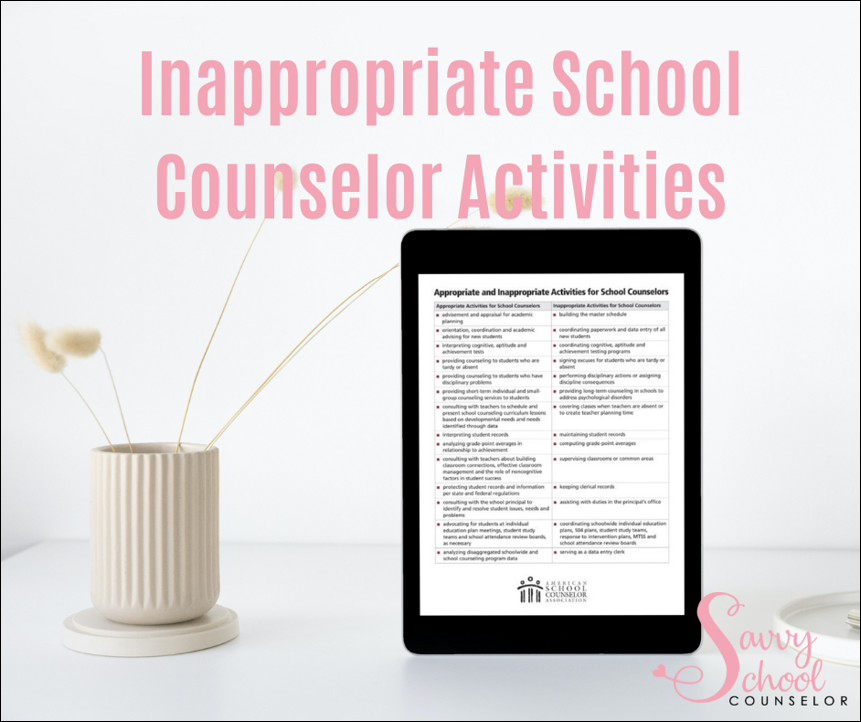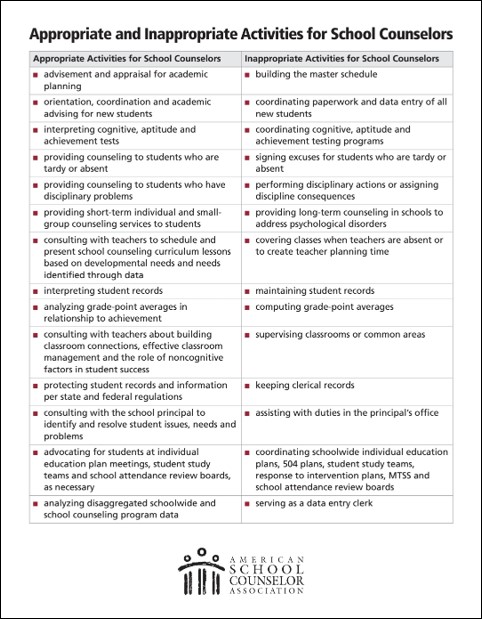Inappropriate School Counselor Activities
The American School Counselor Association’s (ASCA) list of appropriate and inappropriate activities for school counselors is a great reference. School counselors naturally wear lots of hats every day, and many understand that to be part of the job. Today, I will be talking about what ASCA says and sharing the results of an anonymous survey I sent to my email subscribers.
The ASCA document is called “Appropriate and Inappropriate Activities for School Counselors.” Of course, school counselor responsibilities vary across elementary, middle, and high school. For the most part, with a few exceptions, school counselors of all levels provide a majority of the activities on the “appropriate” side of the document from academic planning and new student orientation to advocating for students during IEP or 504 meetings when necessary.
The survey asked for the school level or grades each participant worked with and listed the inappropriate activities for each person to check off all that applied to them. It also included a comment section where participants could add any other thoughts. The commentary revealed true frustrations about how some are being used in their schools as well as some gratefulness when nothing on the list applied to them.
Of the 14 inappropriate activities, I was able to check off 5. Let’s take a look at the results.
Inappropriate Counselor Activities Survey Results
As I would expect, a majority of the participants in the survey were elementary counselors. However, I was glad to also see a good representation of middle and high school counselors as well. There were a few whose assignments spanned across various grade levels not specific to elementary, middle, or high as well.
Next, you can see which inappropriate activities the participants in the survey have been assigned. Interestingly enough, three of my five selections had the highest percentages.
The Top Three
66.3% of the participants are coordinating schoolwide individual education plans, 504 plans, student study teams, response to intervention plans, MTSS, and school attendance review boards. Although each of these management roles was represented in the comments, a larger number of counselors are 504 Case Managers. One survey participant wasn’t aware that 504 case managing was an inappropriate activity and asked, “Who should be coordinating and conducting 504 meetings?” I was given that responsibility my first year as a counselor. Overall, I typically saw assistant principals at the trainings if the assigned person wasn’t the school counselor. Most, however, were school counselors. I guess “who” really depends on the individual administration. Here are just a few more comments:
“This is my 13th year as a counselor and for 12 years I was 504, coordinated SPED paperwork, RTI plans, organized state testing.”
“My biggest frustration is being the 504 case manager – the time and the potential relationship strain with families is overwhelming.”
“504 plans consume my life and make me, the school counselor, look like the bad one when the team determines a student doesn’t qualify.”
“Case manager for 504’s is another area that I think is inappropriate for school counselors. Roles and responsibilities are not consistent and makes it challenging when we are not in the classroom. Are graduate programs teaching students about 504 plans? I learned on the job training how to do 504 plans.” (I learned about 504 “on the job” as well, not in Graduate School.}
I case manage all RTI referred students and write 504 plans
“I wear so many hats! PBIS coach, SST coach, and 504 coach. It’s too much.”
“The data I collect for MTSS is time consuming. 504 Evals and Plan are also on my plate. I love advocating for the child, but I don’t like the time it takes to jump through all the forms for this process. I am also the person at the building level that refers for home instruction due to illness or injury.” (I was assigned as the Homebound Coordinator as well.)
“Gifted testing coordinator, 504 case manager, SPED eval requests come to me and then I collect data and paperwork, academic interventionalist, those are all things that MUST be done, that are a huge part of my job. But those huge parts have nothing to do with my role and how to best support students and families. And those huge parts greatly impact my ability to properly be a school counselor. It’s frustrating and a never ending battle.”
I can really sense the frustration in a lot of these comments. I think we all come into the profession excited to do all of the things we have been taught in our graduate studies, but we are faced with responsibilities we weren’t expecting and it can be very overwhelming.
55.4% of the participants are supervising classrooms or common areas. Some counselors surveyed view covering duties as “fair share.” There are others who feel as though they have more than their fair share. Here are a few of the comments:
“I have often been asked to do many things that are not a school counselor role. I also am split between two schools and still asked to monitor dismissal procedures, lunch duty and hallway duty.”
“Daily lunch duty, daily after school duty, I am a team player, so I’m trying to help out anyway I can.”
“I am also on the morning duty schedule at least once a month for a full week of supervising students from 7:30 am to 7:50am. I am supposed to do crosswalk duty everyday after school.”
“I also have lunch and recess duty every day and morning traffic duty.”
“Hall duty, bus duty, arrival and dismissal duty. I was able to advocate to take away a preschool lunch duty (covering teacher prep).”
“Having arrival and dismissal duty is an issue at times as some students need to see me as they arrive. Also I have to cut my time with a student short to get on my post at dismissal.”
42% of the participants are covering classes when teachers are absent or to create teacher planning time. Covering classes for teachers who are absent has been on the rise since the pandemic hit. One survey participant said, “The substitute teacher problem is a very serious problem that affects elementary counselors in my district.” It has become more difficult for teachers to secure subs over that last couple of years and this is affecting many school counselors. Many are also assigned to the “specials rotation” to give teachers planning time which negatively affects the school counseling program. Here are a few comments:
“Teaching a last minute made-up Career Exploration class to 7th graders because the Family Consumer Science Teacher retired mid-summer.”
“I set to “sub” and “cover” in the classroom for the last 15 minutes of the day, so a teacher can leave early for an appointment.”
“I was also in the specials rotation teaching classes all day long. There was no time to meet with students or run groups.”
“I am in the specialist rotation any year we have 5 classes of a grade level (because we only have 4 specialist teachers).”
“We should not be in the “special area” schedule! I should not be used to allow for someone else’s planning.”
There were so many comments that touched on several areas, but here are just a few:
“I am 1 counselor in a building of 550 students teach classes do groups 1:1 long and short term counseling managing 504 plans building intervention plans managing behavioral concerns, covering classes when teaching staff and paras are out, bus duty and crosswalk duty after school as well as maintaining my role as an elementary counselor”
“…administration tells parents that I can schedule a standing weekly appointment to provide counseling services.”
“Although I advocate for the counseling role with my administration I notice many of them have no clue as to what our role is.”
“Until everyone understands our expectations as School Counselors, from the Superintendent on down to the Janitors, we will always be at a disadvantage.”
“I am very concerned that as a school counselor we are being added to IEP’s as service providers for 1x per week counseling services. This is long term counseling that should be addressed by an outside therapist.”
“After seeing this list, I am thankful I am not assigned more duties than the ones I have. I have a great campus and administration. I have time for guidance and seeing students.”
“Although I do engage in some of those activities, I don’t do them often, and like pitching in when I can. I want staff to know I’m willing to help and because I’m not used so often I can’t do my job, it’s something I’m happy to do.”
Thank you to those who assisted with this post by participating in the survey. I may use specific sections of this data in future posts. I loved having my subscribers contribute this week, and I’ll definitely survey them again in the future.
I think it was good for some to be able to share the things that are overwhelming them currently, and it was great to see a few comments where counselors didn’t feel burdened with inappropriate activities and happy to do their fair share. I do understand that every situation is different. I completely understand the frustrations, and I’m always happy for school counselors who actually get to do the job they entered into this profession to do.
Stick around! You can follow Savvy School Counselor with free email updates. You can also follow my TpT Store to keep up with my latest products and freebies. Additionally, I do giveaways through My Facebook Page with my new products. Be sure to like Savvy School Counselor on Facebook and click to receive notifications so you don’t miss them!





